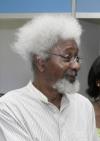Quotes by Wole Soyinka
- 1
- 2
There is only one home to the life of a river-mussel; there is only one home to the life of a tortoise; there is only one shell to the soul of man: there is only one world to the spirit of our race. If that world leaves its course and smashes on boulders of the great void, whose world will give us shelter?
Looking at faces of people, one gets the feeling there's a lot of work to be done.
The man dies in all who keep silent in the face of tyranny.
The hand that dips into the bottom of the pot will eat the biggest snail.
The greatest threat to freedom is the absence of criticism.
Books and all forms of writing are terror to those who wish to suppress the truth.
I ceased using words like optimism and pessimism a long time ago.
It's been difficult, and without a question I've had moments when I just wondered whether we're not really pursuing an impossible ideal.
And I believe that the best learning process of any kind of craft is just to look at the work of others.
My horizon on humanity is enlarged by reading the writers of poems, seeing a painting, listening to some music, some opera, which has nothing at all to do with a volatile human condition or struggle or whatever. It enriches me as a human being.
It takes a jaundiced view of the much-vaunted glorious past of Africa. And I suppose since then I've been doing nothing but the danse macabre in this political jungle of ours.
I believe that there is a kind of osmotic process whereby one intuitively absorbs the various strands that went into the making of a play, a poem, etc.
There's a kind of dynamic quality about theater and that dynamic quality expresses itself in relation to, first of all, the environment in which it's being staged; then the audience, the nature of the audience, the quality of the audience.
One thing I can tell you is this, that I am not a methodical writer.
I was going to direct The Beatification of Area Boy in Kingston, Jamaica, an opportunity at which I leapt because I know Kingston very well. I've taught at the university there periodically as a visitor.
But theater, because of its nature, both text, images, multimedia effects, has a wider base of communication with an audience. That's why I call it the most social of the various art forms.
Well, the first thing is that truth and power for me form an antithesis, an antagonism, which will hardly ever be resolved. I can define in fact, can simplify the history of human society, the evolution of human society, as a contest between power and freedom.
I'm not surrendering that space for some bunch of thugs and murderers and torturers and rapists and robbers. It's just unthinkable. So from that standpoint, you could say that I'm an optimist in the sense that I'm confident I will take it back.
There's something about the theater which makes my fingertips tingle.
And gradually they're beginning to recognize the fact that there's nothing more secure than a democratic, accountable, and participatory form of government. But it's sunk in only theoretically, it has not yet sunk in completely in practical terms.
I consider the process of gestation just as important as when you're actually sitting down putting words to the paper.
I think that feeling that if one believed absolutely in any cause, then one must have the confidence, the self-certainty, to go through with that particular course of action.
Making the Abacha regime understand that the color of the skin makes no difference, that when you have a minority regime oppressing the majority, as in Apartheid South Africa, the treatment has got to be the same as was meted out to Apartheid South Africa.
It isn't so much that I became more of an activist after my imprisonment, it's rather that the situation in Nigeria deteriorated to such an extent that the degree, the intensity, of my activism had to be elevated correspondingly.
One, a mass movement from within, which, as you know, is constantly being put down brutally but which, again, regroups and moves forward as is happening right now as we are speaking.
- 1
- 2






